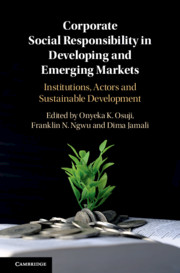 Corporate Social Responsibility in Developing and Emerging Markets
Corporate Social Responsibility in Developing and Emerging Markets Book contents
- Corporate Social Responsibility in Developing and Emerging Markets
- Corporate Social Responsibility in Developing and Emerging Markets
- Copyright page
- Dedication
- Contents
- Figures
- Tables
- Notes on Contributors
- Foreword
- Endorsement
- Preface
- Table of Cases
- Table of Legislation
- 1 Introduction to Corporate Social Responsibility in Developing and Emerging Markets: Institutions, Actors and Sustainable Development
- Part I Institutions, CSR Conceptualizations and Sustainable Development
- 2 Institutional Theory and Corporate Social Responsibility in Developing Countries: a Comparative Institutional Perspective
- 3 CSR and a Capabilities Approach to Development: CSR Laws as an Allocative Device?
- 4 Domestic Adjudicative Institutions, Developing Countries and Sustainable Development: Linkages and Limitations
- 5 The Informal Economy: CSR and Sustainable Development
- 6 Human Resource Management and Political CSR in Global Supply Chains: Causes and Consequences of Host Communities’ Enduring Struggles
- 7 Navigating the CSR Discourse from a Developing Country’s Perspective: a Shift to Human Capital Development?
- Part II CSR and Sustainable Development Cross-Country Studies
- Part III Normative and Utility Perspectives
- References
2 - Institutional Theory and Corporate Social Responsibility in Developing Countries: a Comparative Institutional Perspective
from Part I - Institutions, CSR Conceptualizations and Sustainable Development
Published online by Cambridge University Press: 18 December 2019
- Corporate Social Responsibility in Developing and Emerging Markets
- Corporate Social Responsibility in Developing and Emerging Markets
- Copyright page
- Dedication
- Contents
- Figures
- Tables
- Notes on Contributors
- Foreword
- Endorsement
- Preface
- Table of Cases
- Table of Legislation
- 1 Introduction to Corporate Social Responsibility in Developing and Emerging Markets: Institutions, Actors and Sustainable Development
- Part I Institutions, CSR Conceptualizations and Sustainable Development
- 2 Institutional Theory and Corporate Social Responsibility in Developing Countries: a Comparative Institutional Perspective
- 3 CSR and a Capabilities Approach to Development: CSR Laws as an Allocative Device?
- 4 Domestic Adjudicative Institutions, Developing Countries and Sustainable Development: Linkages and Limitations
- 5 The Informal Economy: CSR and Sustainable Development
- 6 Human Resource Management and Political CSR in Global Supply Chains: Causes and Consequences of Host Communities’ Enduring Struggles
- 7 Navigating the CSR Discourse from a Developing Country’s Perspective: a Shift to Human Capital Development?
- Part II CSR and Sustainable Development Cross-Country Studies
- Part III Normative and Utility Perspectives
- References
Summary
Institutional theory has been used in the study of CSR in developing countries. The chapter offers an insightful new conceptual framework that shows how differing expressions of CSR in developing countries are shaped by the institutional dimensions of the developing country’s institutional context. The chapter proposes a review of the application of institutional theory for CSR in developing countries and how the different comparative CSR frameworks have been used mostly for developed countries. Rather than using existing comparative institutional models such as Varieties of Capitalism (VOC) or National Business System (NBS), the chapter proposes a new theoretical lens to explore CSR in developing countries. Varieties of institutional systems (VIS) aims to expand the conversation on comparative institutional perspectives for CSR in developing countries. The chapter proposes a novel conceptual framework that combines Varieties of Institutional Systems (VIS) theoretical framework with the heterogeneous expressions of CSR in developing countries. This novel conceptual framework is used to explore which expressions of CSR should be implemented by firms in developing countries, depending on the VIS institutional dimensions. Based on the developing country’s institutional context and its institutional dimensions, described by the VIS framework, firms need to adopt a specific expression of CSR in developing countries.
Keywords
- Type
- Chapter
- Information
- Corporate Social Responsibility in Developing and Emerging MarketsInstitutions, Actors and Sustainable Development, pp. 17 - 30Publisher: Cambridge University PressPrint publication year: 2019
References
- 4
- Cited by


